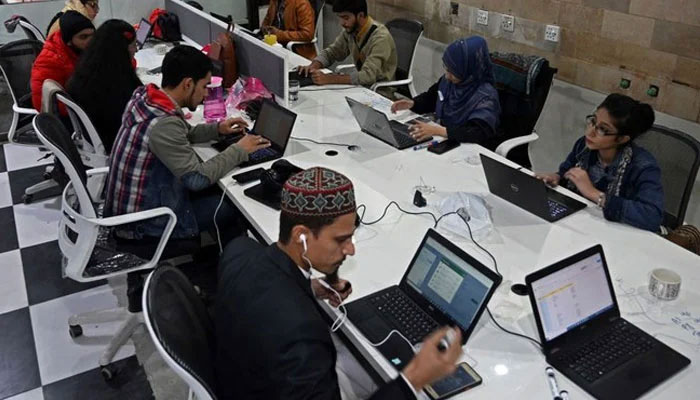The evolving entrepreneurial ecosystem
LAHORE: Pakistan’s entrepreneurial ecosystem is still developing, though there have been notable successes in tech, e-commerce, fintech, and social enterprises. However, the environment is marked by numerous drawbacks.
Entrepreneurship refers to the process of identifying and seizing opportunities to create and grow a business or enterprise. Entrepreneurs are individuals who take risks to innovate, develop new ideas or find solutions to problems, often with the aim of profit-making, personal fulfilment, or societal impact.
Entrepreneurship thrives when high-impact entrepreneurs operate within tight-knit networks. These networks allow successful entrepreneurs to mentor their peers by sharing knowledge and experience, providing financial capital and investment to promising ventures, and offering constructive feedback, which helps entrepreneurs grow.
Networks also create an ecosystem where risk-taking becomes normalized, and success stories inspire others to pursue entrepreneurship. This collaborative approach can significantly enhance the chances of entrepreneurial success and long-term sustainability. Unfortunately, this ecosystem is largely missing in Pakistan.
Sometimes, fluke successes -- where an entrepreneur’s business thrives due to favourable market conditions, luck, or external factors -- are mistakenly attributed to entrepreneurial acumen. Sustainable entrepreneurial success typically involves a combination of strategic planning, market understanding, adaptability, and hard work. It is also true that entrepreneurs cannot succeed alone; they often require mentorship for guidance, access to networks for resources and connections, collaboration with teams to scale their businesses, and capital investment to fuel growth, in addition to policy support from the government.
Pakistan’s entrepreneurial landscape is marred by limited access to venture capital, regulatory hurdles that complicate starting and scaling businesses, inconsistent government support, infrastructure challenges and a lack of education and entrepreneurial training at a mass level. While there are pockets of success, we have not fully realized its entrepreneurial potential compared to regional counterparts like India. However, with a large young population, digital growth and increasing interest in startups, the potential is significant.
To promote an entrepreneurial culture, the government should simplify regulations and reduce red tape to make it easier to start businesses. It should also improve access to finance by fostering venture capital funds, angel investment networks and SME loans. There is also a need to promote entrepreneurial education through schools and universities. The establishment of incubation centres and technology parks that provide startups with infrastructure and mentorship is a positive step. However, fostering collaboration between industry and academia to boost innovation is essential, as the weak digital infrastructure currently discourages technological advancement.
Startups need tax incentives and reduced corporate taxes in their early stages to facilitate growth. The government should also promote export-focused entrepreneurship by helping startups expand into international markets and creating public-private partnerships to build a sustainable entrepreneurial ecosystem.
Entrepreneurship is rising in South Asia, especially in countries like India and Bangladesh, where tech-driven startups, micro-entrepreneurship and social enterprises are making significant impacts. However, the region also faces challenges such as limited access to financing, bureaucratic red tape, inadequate infrastructure and cultural resistance to failure, which can stifle entrepreneurial growth.
The US, led by Silicon Valley, is at the forefront of the entrepreneurial ecosystem, followed by China, where large markets and innovation are strongly supported by the government. Germany is known for its industrial startups, while London’s finance hub occupies the fourth position, and India ranks next with notable entrepreneurial ventures in tech, e-commerce and social enterprises.
-
 All You Need To Know Guide To Rosacea
All You Need To Know Guide To Rosacea -
 Princess Diana's Brother 'handed Over' Althorp House To Marion And Her Family
Princess Diana's Brother 'handed Over' Althorp House To Marion And Her Family -
 Trump Mobile T1 Phone Resurfaces With New Specs, Higher Price
Trump Mobile T1 Phone Resurfaces With New Specs, Higher Price -
 Factory Explosion In North China Leaves Eight Dead
Factory Explosion In North China Leaves Eight Dead -
 Blac Chyna Opens Up About Her Kids: ‘Disturb Their Inner Child'
Blac Chyna Opens Up About Her Kids: ‘Disturb Their Inner Child' -
 Winter Olympics 2026: Milan Protestors Rally Against The Games As Environmentally, Economically ‘unsustainable’
Winter Olympics 2026: Milan Protestors Rally Against The Games As Environmentally, Economically ‘unsustainable’ -
 How Long Is The Super Bowl? Average Game Time And Halftime Show Explained
How Long Is The Super Bowl? Average Game Time And Halftime Show Explained -
 Natasha Bure Makes Stunning Confession About Her Marriage To Bradley Steven Perry
Natasha Bure Makes Stunning Confession About Her Marriage To Bradley Steven Perry -
 ChatGPT Caricature Prompts Are Going Viral. Here’s List You Must Try
ChatGPT Caricature Prompts Are Going Viral. Here’s List You Must Try -
 James Pearce Jr. Arrested In Florida After Alleged Domestic Dispute, Falcons Respond
James Pearce Jr. Arrested In Florida After Alleged Domestic Dispute, Falcons Respond -
 Cavaliers Vs Kings: James Harden Shines Late In Cleveland Debut Win
Cavaliers Vs Kings: James Harden Shines Late In Cleveland Debut Win -
 2026 Winter Olympics Snowboarding: Su Yiming Wins Bronze And Completes Medal Set
2026 Winter Olympics Snowboarding: Su Yiming Wins Bronze And Completes Medal Set -
 Trump Hosts Honduran President Nasry Asfura At Mar-a-Lago To Discuss Trade, Security
Trump Hosts Honduran President Nasry Asfura At Mar-a-Lago To Discuss Trade, Security -
 Cuba-Canada Travel Advisory Raises Concerns As Visitor Numbers Decline
Cuba-Canada Travel Advisory Raises Concerns As Visitor Numbers Decline -
 Anthropic Buys 'Super Bowl' Ads To Slam OpenAI’s ChatGPT Ad Strategy
Anthropic Buys 'Super Bowl' Ads To Slam OpenAI’s ChatGPT Ad Strategy -
 Prevent Cancer With These Simple Lifestyle Changes
Prevent Cancer With These Simple Lifestyle Changes




